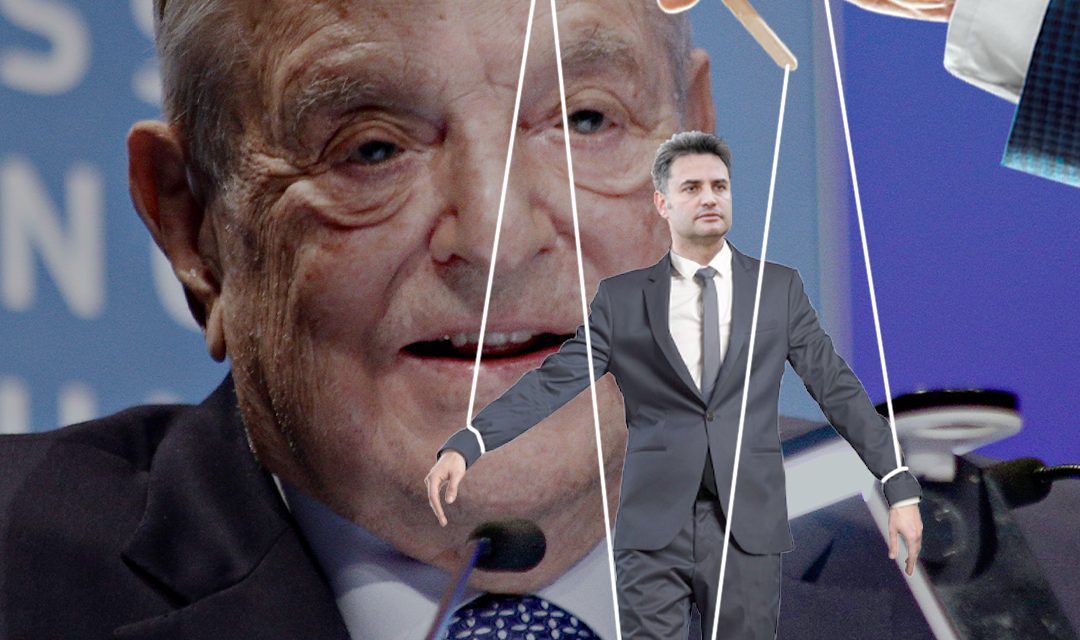Since his victory in the primary election, Péter Márki-Zay's politics have been determined even more emphatically by serving the interests of György Soros and the globalist forces.
His open support for immigration and the LGBTQ lobby, the fight against utility cuts, and the desire to abolish the minimum wage all serve a specific purpose - to gain the political and financial support of the international left-wing network. This strategy has long-standing traditions on the domestic left, to which the opposition's candidate for prime minister seems to adapt perfectly, so it is no coincidence that he recently sat down at the negotiating table with several leading figures of the Soros network. At the same time, there is no doubt that unconditional compliance with globalist interests would not only threaten Hungary's sovereignty, but also lead to a drastic deterioration of living standards, writes Századvég in its analysis, which is reviewed by Origo.
On October 20, Péter Márki-Zay took a stance in favor of immigration in his interview with CNN as the left-wing prime ministerial candidate, and two days later he stood up for the LGBTQ lobby in the columns of Newsweek magazine, condemning the Hungarian government's child protection measures on this issue . The globalist-oriented policy came to fruition on October 23, when Péter Márki-Zay stated at the joint commemoration of the left, relativizing the role of the American speculator in immigration:
"They haven't been able to prove the resettlement of a single migrant about György Soros".
The communication aligned with the left-liberal mainstream, as well as the open stance in favor of György Soros, was organized according to a conscious strategy: Péter Márki-Zay also wanted to use the political tool of the Brussels tours, which have become a habit on the domestic left, in order to be able to negotiate with the leading actors of the international left-wing network.
The method worked, because in the first half of November, Péter Márki-Zay was invited to the Belgian capital for a series of talks over several days, where among the EU decision-makers and political actors directly or indirectly connected to Soros, he met, among others, Věra Jourová, the European Commission's vice-president responsible for values and transparency, Ska Keller , he was also able to consult with the leader of the Greens faction, Iratxe García Pérez, the president of the Progressive Alliance of Socialists and Democrats (S&D), and Manfred Weber, the leader of the European People's Party.
From the ranks of the People's Party, which is gradually abandoning traditional European and Christian values, no less than 36 representatives are on the OSF's reliability list (a document titled Reliable Allies in the European Parliament from the internal database of the Open Society Foundations (OSF) founded by György Soros). One of the leading figures of this clear shift to the left is Manfred Weber, who not only expressed himself clearly along the lines of left-liberal interests in connection with the support of the Sargentini report, but was also an active participant in the exclusion procedure, which was initiated by the member parties of the People's Party, among others, due to the situation of the Soros University in Hungary. initiated.
THIS GLOBALIST-ORIENTED POLICY WAS FRAMEWORKED BY WEBER IN A LATER POST ON TWITTER WHEN HE STATED THAT "IN TODAY'S WORLD THERE IS NO NATIONAL SOVEREIGNTY. […] WE LIVE IN A GLOBALIZED WORLD".
Analyzing Márki-Zay's policy following the meetings in Brussels, we can get a clear picture of what expectations the globalist forces had for the opposition prime minister candidate: soon after his return, the mayor of Hódmezővásárhely defended György Soros in connection with immigration in a poster campaign, and he also repeatedly criticizes the government's utility-reduction measures in the interests of small consumers, acknowledging that it would apply a pre-2010 neoliberal approach that served the interests of multinational energy companies, and finally abolish the minimum wage, which would pave the way for the salary reduction efforts of foreign-owned giant companies and the freezing of wages.
IT CAN BE CLEARLY SEEN THAT PÉTER MÁRKI-ZAY, WHO DETERMINES HIMSELF AS A RIGHT-WING, CONSERVATIVE CANDIDATE, DOES NOT ACTUALLY REPRESENT CLASSICAL RIGHT-WING VALUES, ON THE CONTRARY, THE DIRECTION OF HIS POLICY IS DETERMINED BY THE GOALS OF GYORGY SOROS AND THE BALLIBERAL FORCES.
At the same time, unconditional compliance with globalist interests would not only threaten Hungary's sovereignty, but would also lead to a drastic deterioration in the standard of living, which would primarily affect low- and medium-income earners.
Source and full article: origo.hu
Featured image: End of the century












